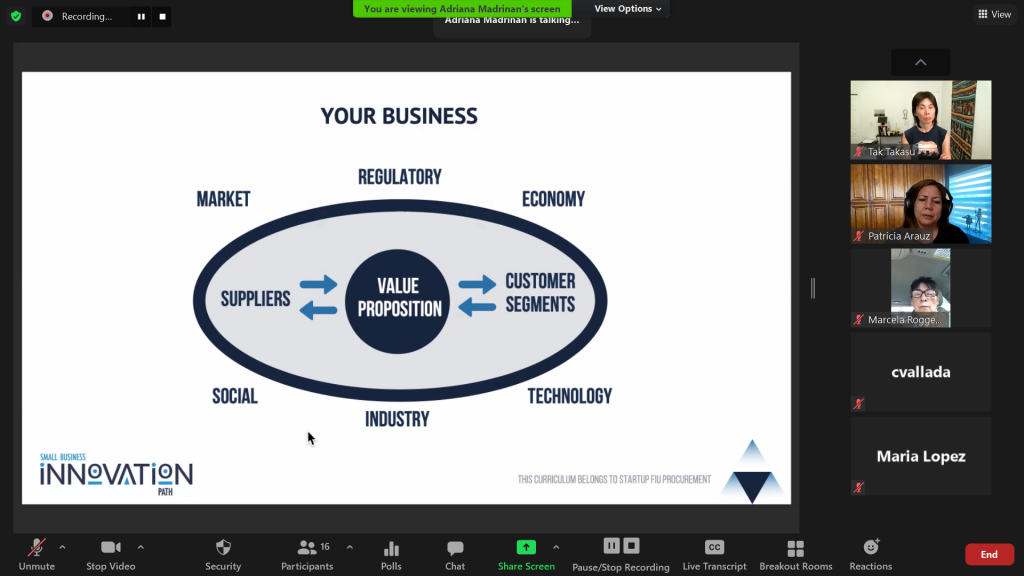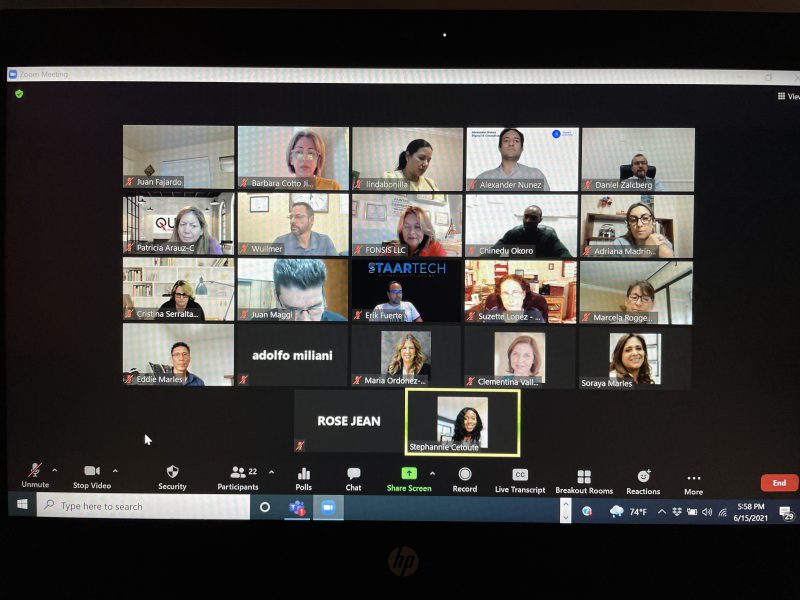It’s been nearly three years since Florida International University launched StartUP FIU Procurement to help minority-led small businesses grow and navigate the world of government and anchor institution contracting. Let’s check in with StartUP FIU Procurement Director Barbara Cotto and see how they are doing.
The small business incubator was born out of discussions about how information about FIU’s own contracting opportunities weren’t reaching minority-owned small businesses at the levels the university wanted. Turns out other entities around South Florida, including universities and government entities, were having similar issues.
StartUP FIU Procurement’s incubator program is now 14-weeks long and offers capacity building, business tools and networks to help small businesses become procurement-ready for both government contracting and in the private sector. The cohorts, which have been averaging about 14 people, are taught by FIU’s faculty and facilities experts, as well as consultants with Florida SBDC at FIU, the small business development center within the university’s College of Business, and the private sector.
“We specialize in two types of cohorts. One is an industry mix, which is Business Development for Diverse Industries, but we’ve also developed a cohort and curriculum for construction entrepreneurs,” Cotto explained. “We just finished Cohort 4 and we have already graduated 45 business owners in IT, marketing and promotions, wholesaling and distribution, janitorial and custodial services, and construction.” Small businesses can learn more and apply here.
Cotto said a key reason for the of programs like hers is job creation. “What we are doing is expanding their opportunities for their business to grow and therefore opening opportunities for others to have access to jobs. A one-man show can only take you a certain level, but if you grow that means that you generate employment, and the opportunities for your business to even double or triple because you have more eyes and more sets of hands on to move it forward. This not only contributes in terms of contracting and access to wealth, but also to job creation.”
StartUP FIU Procurement has always been a partner with FSBDC at FIU but during the pandemic, the partnership grew stronger. In addition to FSBDC helping with access to relief loans and as instructors, StartUP FIU Procurement businesses were asked to start working with a lead consultant from the FSBDC and the work they do together becomes part of their measurable goals, Cotto said.
We chatted with Cotto about the pandemic pivots — the program went 100% virtual for cohorts 2, 3 and 4 and nimbly adapted to the new needs of businesses during the pandemic. We also talked about what’s ahead for the organization [spoiler alert: Big plans for a ladder program to help small businesses at differing stages is ahead].
What were some of the lessons learned during the pandemic?
Cotto: The first amazing thing to mention is all of our companies survived the COVID lockdowns and all the challenges provoked by COVID. All our companies were able to continue operating. We were able to provide assistance and help them to access up to close to $650,000 worth of PPP and EIDL loans With the support of the SDDC at FIU. They have also been able to pivot their businesses, and understand that there are other segments that they could explore, and that has helped them keep afloat through the challenges of COVID.
We have learned that needs have changed. The needs are not only in structure, and foundation, but they’re in need of organizational skills. Additionally, they’re in need of even more basic services, such as understanding their insurance policies, the requirements, their liabilities, and how can they protect themselves. The environment has also changed for contracting, because they now they need to be smarter about whether or not they really pursue a request for proposal, because the terms and conditions of contracting have changed, and the limitations of how much personnel, or how many trades you can you have on the job, have changed and therefore, the expectations of completion are different. And if you’re not aware of that, you can sign up yourself for a liability. Those have been part of the learnings, but also the understanding of keeping a good credit score, and having access to capital.

How have you changed your curriculum during this crisis?
Cotto: We had to adapt our curriculum completely. The beauty among the negative side of COVID was that we had re-adapted the curriculum right before the pandemic hit. So we converted immediately into remote settings, and the offers have been remote from cohort two all the way through cohort four. We also had to completely revisit the curriculum to be more inclusive of financial areas that in the past were not in so much detail, and I what I mean is … basically the businesses were logging in income and expenses, but without much knowledge of whether or not they were being profitable or not. We had to be more specific in the areas of recognizing the expenses and costs, and how to price their product or services.
We also had to be very emphatic on the Human Resources side, because COVID came in to change the rules and regulations also for employees and what was required for short term leaves and family leaves at that point in time. Also in understanding how can you possibly revisit your segmentation, and most every business was trying to figure out a strategy around marketing in the digitization era. Therefore, we need to maximize our efforts on social networks and explore other areas in order to push and promote our businesses, and even to have sales. Many of them were able to pivot and actually use Amazon, Etsy, and other platforms to push their products forward. That was part of what we needed to include within the curriculum, but also we had to add to the curriculum how to organize and strategize, so we also adapted a methodology, OGSM, which is objectives, goals, strategies and measures to help business owners get organized, organize their teams and establish KPIs. So we had to revisit all these areas.
We had to adapt the curriculums for each one of the cohorts. So, the last three curriculums have had totally different curriculums from each other. We also tailor the curriculum to the groups that we recruit and that’s the importance of the interviewing process, because we identify areas of need. And as we begin the 14 week journey, we continue to adapt curriculums.

What’s next? Do you have new programs coming out?
Cotto: Now, in partnership with FSBDC at FIU and and FIU’s School of Construction, what we’re aiming to do is actually to open the next stage of the program, which is going to be a ladder program. What does that mean? it means that we will be servicing those in trade areas interested to become entrepreneurs, and we will do programming specific for those that want to get started with their business. We will do a startup incubator and for those that we have provided services to in the last two years, and they have reached their level of understanding and their business is evolving, we are going to offer the accelerator program, which is more tailored to specific needs. In other words, instead of being a 14-week program, it is by module on areas of identified needs of the business to continue to improve. For example, if they need to strengthen their finances, there will be a full module for finances, they need to strengthen their marketing, that will be the area for a module. So we are basically laddering from startup to the next phase, which is the incubator that we’ve been doing, and then the accelerator.
We also continue with the workshop offering, with a one on one consulting and with the mentoring program.
A FEW SUCCESS STORIES
Florida SBDC at FIU and StartUP FIU Procurement have worked together to help numerous small businesses. Here are a few:
- Nesi Solutions, a small business founded in 2007 by Flor and Alfredo Utset, designs, implements and maintains HVAC (heating, ventilation and air-conditioning) systems and building automation solutions for its commercial clients, using today’s technology to improve performance and energy savings while providing clean, comfortable air. Nesi has worked with Florida SBDC at FIU, who linked the Utsets up with the StartUP FIU Procurement program for hands-on help with government contracting. The Utsets participated in a cohort that specialized in the construction industry. Going through the program “has been a really life changer because it is much more oriented to the construction side, and we are able to, in a short period of time, understand the market, be strategic and make some quick decisions to improve the situation — and be able to focus on the future,” Flor said. READ THEIR STORY HERE.
- Stephannie Cetoute took over the reins of the family business, Amer Plus Janitorial Maintenance, in 2018. While she had a background in economics and finance and from time to time helped out her father who started the business in 1998, going in “full throttle” to run a business for the first time was all new territory, she said. FSBDC at FIU assisted her but also o referred the company to StartUP FIU Procurement, which Cetoute said was also instrumental in learning about the process and setting her company up for success. She went through that program last fall, finishing in January. “For us, it’s a really good time to be a minority-owned business. There are a lot of opportunities that are being carved out for minority businesses at this point so it’s also good for us to optimize on some of the certifications that we have and consider some certification that may be beneficial for us.” READ HER STORY HERE.
- Gloria Fonseca of Fonsis LLC left her social work career to take the lead on running the family business, a full-service painting and carpentry company committed to promoting eco-friendly materials. Fonsis was able to win small contracts with different private entities but was seeking business from anchor institutions. “The biggest win for Gloria was she realized that because of the segment of business she’s in, she needs partners. She has now been working with 5 of the 11 contractors in that cohort, and in addition she has been able to achieve several additional maintenance contracts. She has achieved about 20 contracts, most of them among the 8 team members,” said Cotto, shortly after the first cohort ended in late 2019. And now? “Gloria has continued to receive services from us and SBDC and has executed multiple contracts,” said Cotto, calling Fonsis an “amazing” success story.
LEARN MORE ABOUT PROCUREMENT: Cotto recently led a panel discussion with procurement leaders from Miami-Dade County, Miami-Dade Public Schools, FIU, UM and Turner Construction. View it here.

